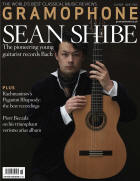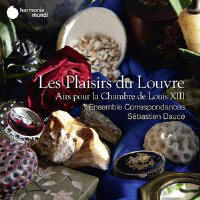Texte paru dans: / Appeared in: |
|
|
Outil de traduction (Très approximatif) |
|
|
Reviewer:
Richard Lawrence The pleasures here are not concerned with the pictures and sculpture of the present-day museum but with musical activity in the reign of Louis XIII, when the Louvre was the monarch’s principal residence. The air de cour, a short setting of verses that could be performed in various configurations from voice and lute to an ensemble of voices and instruments, was popular in the salons of Paris as well as at court. There was also music for the ballets that were danced by the king and queen and the courtiers, played by professional musicians. The most important composer was Antoine Boësset: he published nine volumes of Airs de cour à 4 & 5 parties between 1617 and 1642 and, as Surintendant de la Musique de la Chambre du Roi, he was responsible for organising the musical entertainment both public and private. Of the 28 tracks on this enjoyable CD, 15 are devoted to Boësset. The subjects include love – more the pains than the pleasures thereof, actually – and sycophantic addresses to the king. One song, ‘Conseille-moi mon coeur’, is a recasting of his ‘Qui vit jamais amant’ to a religious text. It was published in Boësset’s lifetime, so would have had his approval: more than can be said of the adaptation of the two numbers by Pierre Guédron, his father-in-law and predecessor, which appeared posthumously. The pieces are mainly homophonic with a touch of counterpoint here and there, as in Boësset’s ‘Monarque triomphant’. Many are in the minor key, and often in triple time. The predominant mood is one of delicate wistfulness: this is not a musical world of aching suspensions and chromaticism. The singers of Ensemble Correspondances, led by the sopranos Caroline Weynants, Caroline Bardot and Élodie Fonnard, are a beautifully blended team who express these refined sentiments to perfection. A good example is Boësset’s ‘Me veux-tu voir mourir’, a restrained performance for SATB; another approach can be enjoyed on ‘L’esprit galant’ (Channel Classics, 5/08), where Johannette Zomer sings a solo version a semitone higher, with brighter tone and more prominent decoration. There’s excellent support from a consort of viols, a flute and a continuo group under Sébastien Daucé. Pleasures indeed! |
|




